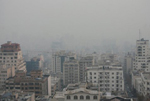 UPI: The Iranian people had many hopes after the fall of the shah in February 1979 but that great revolution was hijacked by Ayatollah Ruhollah Khomeini and the Islamic fundamentalists and a much more ruthless tyranny began.
UPI: The Iranian people had many hopes after the fall of the shah in February 1979 but that great revolution was hijacked by Ayatollah Ruhollah Khomeini and the Islamic fundamentalists and a much more ruthless tyranny began.
United Press International
By STRUAN STEVENSON, UPI Outside View Commentator
 BRUSSELS, Feb. 14 (UPI) — The Iranian people had many hopes after the fall of the shah in February 1979 but that great revolution was hijacked by Ayatollah Ruhollah Khomeini and the Islamic fundamentalists and a much more ruthless tyranny began.
BRUSSELS, Feb. 14 (UPI) — The Iranian people had many hopes after the fall of the shah in February 1979 but that great revolution was hijacked by Ayatollah Ruhollah Khomeini and the Islamic fundamentalists and a much more ruthless tyranny began.
Thousands of political prisoners have been executed. The brutal suppression of women, young people and religious and ethnic minorities have continued without pause. The United Nations has condemned these atrocities in 59 General Assembly resolutions.
Iran has endangered peace and security in the region and the world through its efforts to acquire a nuclear bomb, first revealed by the Iranian opposition in 2002, and through the export of terrorism and fundamentalism. The regime is the main supporter of Bashar Assad in Syria and the emerging dictatorship in Iraq under Nouri al-Maliki.
U.S. and European policy regarding Iran in these 34 years has been an absolute failure. The main opposition People’s Mujahedin of Iran was placed in various terrorist blacklists at the behest of Iran. That was a precious gift to the mullahs and acted as the main obstacle for democratic change.
The PMOI and their political coalition — the National Council of Resistance of Iran — together with their allies in many parliaments launched a massive campaign against this injustice and won historic court victories in both the United Kingdom and the European Union when the respective judges ordered that they should be de-listed.
Finally, this judicial battle was victorious in the United States when the State Department under Hilary Clinton ordered their de-listing on Sept. 28, 2012.
It was therefore a disappointment that in a recent conference in Munich, U.S. Vice President Joe Biden offered Ayatollah Ali Khamenei, the Iranian supreme leader, direct negotiations.
It is crystal clear that negotiations with this regime lead nowhere, simply buying them more time to develop their nuclear arsenal, spread terror and intensify their oppression.
Khamenei’s negative response on Feb. 7 to Biden’s initiative showed that such offers are taken as signs of weakness and are counterproductive and would only add to the Iranian people’s distrust of the West. Iranians haven’t yet forgotten U.S. President Barack Obama’s cold shoulder to the general uprising in 2009.
Today, this regime is the weakest it has ever been. Social isolation, deep economic crises and society’s explosive potential have created fault lines inside the regime.
Confrontation between President Mahmoud Ahmadinejad and Khamenei is an everyday occurrence, while up until a couple of years ago Ahmadinejad was Khamenei’s hand-picked puppet.
Similarly confrontation between Ahmadinejad and the Larijani brothers who control the Parliament and the judiciary and confrontation between Iran’s traditional bazaar and Khamenei, and Khamenei’s isolation among the senior clerics have placed the regime on the brink of collapse.
Under these circumstances, the external powers’ softness and appeasement toward this regime only help to resolve its crises and encourage it to be more aggressive.
There is no need for foreign military intervention to bring about regime change in Iran. The Syrian scenario won’t be repeated in Iran because there is a leading movement in Iran that didn’t exist in Syria.
What we need is to adopt a firm policy, implement wide-ranging sanctions and back the Iranian democratic opposition.
The execution of more than 120,000 PMOI members and activists, the eviction of its members from their homes in Camp Ashraf in Iraq, and placing them on Western terror lists haven’t only failed to destroy them but have actually given them further strength and solidarity.
By surviving these crises, the PMOI, under the leadership of Maryam Rajavi, is further qualified to lead the Iranian people toward its goal of regime change.
—
(Struan Stevenson is a Conservative Euro Member of Parliament from Scotland. He is president of the European Parliament’s Delegation for Relations with Iraq. He also is chairman of the “Friends of a Free Iran” intergroup in European Parliament.)


